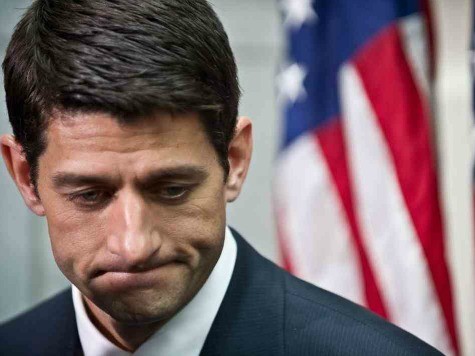
Sen. Jeff Sessions (R-AL), the ranking member of the Senate Budget Committee, has released a section-by-section analysis of the spending deal House Budget Committee chairman Rep. Paul Ryan (R-WI) cut with Senate Budget Committee chairwoman Sen. Patty Murray (D-WA).
“The Bipartisan Budget Act (BBA) of 2013 would increase the discretionary spending caps established by the 2011 Budget Control Act (BCA) by $45 billion in 2014 and $18 billion in 2015,” the opening paragraph of the analysis reads. “The $63 billion in higher spending is not offset over the BCA window of 2014-2021; during that period, the legislation increases spending by almost $25 billion, as 53% of the offsets in the BBA realized during the BCA window come from higher fees and revenues.”
“Additionally, $47 billion of the BBA’s $85 billion offset package (56%) are realized in FY 2022 and FY 2023–the final years of the current budget window, but beyond the timeframe of the current law BCA agreement,” the analysis notes.
Sessions’ committee staff went section-by-section through the full plan, showing all the issues with the bill. The analysis, in full, can be read in a document published by the Senate Budget Committee GOP staff.
Sessions has been vocal in his opposition to the Ryan-Murray deal. In a statement he released before the House voted to pass it, Sessions said that a “series of concerns, on balance, cause me to be unable to support the legislation produced by Chairman Ryan and Chairman Murray.”
Sessions listed several of his specific concerns with the plan.
“While I favor reorganizing elements of the Budget Control Act to smooth the impact, I do not favor increasing total discretionary spending above what was agreed to over the 10-year BCA period (exchanged for the already-exhausted $2.1 trillion debt increase in 2011),” Sessions said. “I specifically do not favor using trust fund savings to increase discretionary spending.”
“Much of the spending increase in this deal has been justified by increased fees and new revenue. In other words: it’s a fee increase to fuel a spending increase–rather than reducing deficits,” he explained. “Disappointingly, CBO’s analysis states that $47 billion out of the $85 billion in offsets occur outside the original BCA window, and the spending cut portion of those outyear offsets are of dubious validity. It is not disputable that net spending in the BCA window is increased.”
Sessions added that technically this plan is not even really a budget since Ryan and Murray abandoned commitments to a budget conference–making the legislation actually just a spending bill.
“Senate and House budget resolutions were committed to Conference,” Sessions said. “They were not acted on. The result is legislation from Chairman Ryan and Chairman Murray, leaving Congress without a budget resolution for the fourth straight year. This legislation is not a budget and was never formally considered, crafted, or voted upon by the conferees.”
“I appreciate the hard work Chairman Ryan and Chairman Murray put into their deal, but I am not able to support it,” he stated.

COMMENTS
Please let us know if you're having issues with commenting.